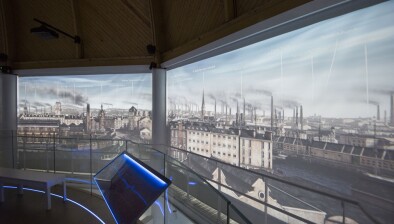Court of Session rules against Dundee City Council’s e-bike station planning approval

A judge in the Outer House of the Court of Session has declared that a purported planning grant for an e-bike docking station outside a Category B listed tenement building in Dundee is ultra vires and of no effect after the decision was challenged by locals.
Westend Residents CIC, a community interest company incorporated to represent the views of residents of the West End Suburbs Conservation Area in Dundee, challenged the grant by Dundee City Council of a planning application submitted by Ride On Scotland.
The petition was heard by Lord Weir. The petitioners were represented by Logan, advocate, and the respondents by Armstrong QC.
Serious errors
On 1 September 2020, an agent of Ride On Scotland submitted a proposal for an e-bike docking station, comprising 10 docking points and a terminal, on the public footpath outside the entrance to the building on 5 Blackness Avenue, Dundee. The proposal formed part of a wider e-bike scheme being developed throughout Dundee, albeit with the other docking sites being primarily in industrial, commercial, or retail areas.
Following five initial objections to the application based on adverse effect on a listed building, noise nuisance, impact on access to waste bins and parking spaces, and privacy and road safety concerns, an appointed officer of the respondents assessed the application, however the decision to approve planning permission was still taken.
It was submitted for the petitioners that there were serious errors in the process by which the permission was granted. The application had not been accompanied by a design statement, which was a mandatory requirement under regulation 13 of the Town and Country Planning (Development Management Procedure) (Scotland) Regulations 2013.
Counsel further submitted that the respondents’ planning officer, Ms Duffy, who assessed the application had given no consideration at the time to whether the installation of the station constituted an “engineering operation”, an excepted category to regulation 13. In any event, it could not be considered one as there was nothing in the process of installing the docking station that required an engineer.
Ex post facto
In his decision, Lord Weir began by noting: “There is force in the petitioners’ submission that the respondents’ characterisation of the installation of the docking station as an engineering operation is one reached ex post facto. In the application for planning permission, the applicant answered the pro forma question whether a design statement had been provided in terms of 2013 Regulations, that such was ‘not applicable’ to the application.”
He continued: “If there had been a statutory basis for [Ms Duffy] not requiring the provision of a design statement, it is surprising that that was not stated explicitly in [her] affidavit. Absent such a statement it is reasonable, in my view, to infer that Ms Duffy did not consider the implications, for the application for planning permission, of regulation 13(3) of the 2013 Regulations (as opposed to conducting a comparison of the application with others in which she had required a design statement).”
Turning to whether the installation would constitute an engineering operation, he said: “The nature and appearance of the docking station might induce on the part of many a degree of scepticism about the respondents’ late characterisation of the installation of the docking station as an engineering operation.”
He went on to say: “If it was necessary to decide that issue, I should have been inclined to the view, in coming to it, that those features, taken with the obvious intention of the applicant that the docking station be permanently located, as street furniture, within the conservation area, immediately adjacent to a listed traditional west end tenement, militated against a concentration on the process of installation rather than the end result.”
On whether the failure to include a design statement invalidated the approval of the application, Lord Weir said: “I have ultimately come to the view that it would be inappropriate for the court, in the exercise of its discretion, to refuse the petitioners any remedy on this basis. I do not consider that it can be said with confidence that the outcome would not have been affected if, after proper consideration of the question, the respondents had required the submission of a design statement.”
He concluded: “It is impossible to know what the outcome of the process of public notification would have been had a design statement accompanied the application for planning permission in this case. One certainly cannot assume that the same five objectors, or only those five objectors, would have come forward with the same objections. It is significant though that, had there been one more objection, the matter would require to have been considered by a committee of the respondents.”
For these reasons, Lord Weir granted decree of declarator that the grant of planning permission was no effect.















